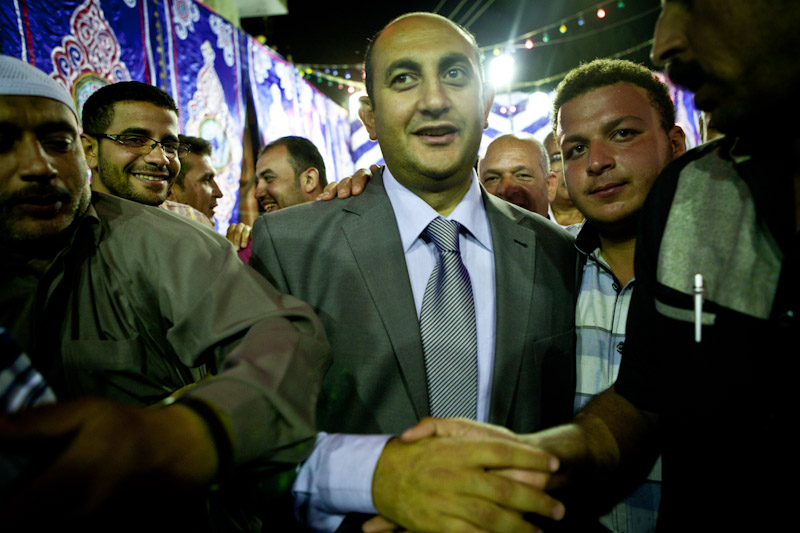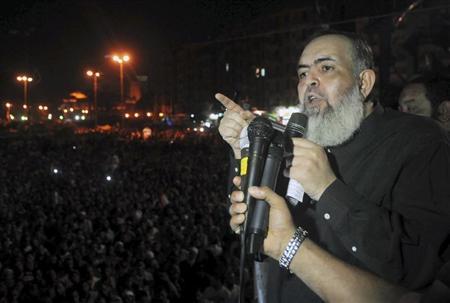For several years, Hazem Abu Ismail appeared on Salafi satellite channels in traditional Salafi garb — a robe and a white headscarf dangling on the shoulders — to preach to the Muslim masses.
Shortly after Hosni Mubarak's ouster, the preacher relinquished his Salafi dress, put on a western suit and a necktie, and turned into a regular guest on news channels entertaining questions not only from male hosts but also from unveiled female anchors — an attitude quite unexpected from a Salafi leader.
This shift in appearance and attitude was quite necessary after Abu Ismail announced his intention to run for president in post-Mubarak Egypt. Since his announcement in May, the 51-year-old bearded lawyer has sought to diffuse fears of liberals, Christians and the West about his Salafi label, but such attempts were not always bound to succeed. In the meantime, his revolutionary and confrontational discourse vis-a-vis Egypt's ruling generals has distinguished him from most Islamist factions.
Hailing as a Salafi Brother
Abu Ismail grew up in an Islamist family; his father was a prominent leader of the Muslim Brotherhood and a scholar at the prestigious Al-Azhar University. Abu Ismail graduated from law school and had worked as a lawyer for more than 20 years. In 2005, he was elected as a member of the Lawyers Syndicate.
Besides his activism at the syndicate, Abu Ismail was a middle-ranking leader in the Muslim Brotherhood. He ran for Parliament in 1995 and 2005 on the Muslim Brotherhood's ticket. In both rounds, he blamed his defeat on state-sponsored vote rigging.
His long and thick white-haired beard, which sets him at odds with the majority of shaved Muslim Brothers, stands as evidence that he has been one of the Salafi voices within the nation's oldest Islamist organization.
In recent months, he has been making conflicting statements on his affiliation to the group. In September, he told a non-Islamist satellite channel that he was a member of the group. In an earlier interview with a Salafi channel, he said that he was just a supporter.
For some observers, Abu Ismail might be downplaying his ties with the Brothers in Salafi media outlets to secure as many Salafi votes as possible, given the historic animosity between the Brothers and Salafis. While Salafis hold that the Muslim Brotherhood compromises Islamic values to achieve political gains, the mainstream Brothers dismiss the Salafi outlook as intransigent.
Nevertheless, Salafi thought had infiltrated the Muslim Brotherhood decades ago, mainly through members who worked in Saudi Arabia.
Sending mixed messages
"The rational implementation of Islamic Sharia" is the first item on Abu Ismail's political platform. "The Sharia has to be implemented immediately," reads the platform posted on his official website. "[But] patience and assessing how ready people are for that is required." With his soft voice, Abu Ismail has tried to send assurances through the local media that he will be prudent and gradual in implementing Islamic laws.
But in August, his appearance on a TV show arguing that a Muslim president should ensure that all religious rituals are observed, that women, whether Christian or Muslim, wear headscarves, and that all Muslims perform prayers was enough to alienate liberals, feminists and Christians. These groups suspect that Abu Ismail would turn Egypt into a religious state a la Saudi Arabia if he attained power. In a famous incident, Abu Ismail had advised a TV presenter, who was interviewing him about his presidential campaign, to put on the veil.
Nevertheless, his discourse on Egyptian-Israeli relations has shown some pragmatism. Although he dismisses Israel as "a criminal state" that occupies Muslim territories, he affirms that he has no intention to antagonize it.
"I am an enemy of the Camp David accords and the peace treaty, but when I turn into a statesman, I should not just act according to my political whim," he said in an interview, adding that he would not abolish the peace accords or wage war against Israel, acknowledging that Egypt cannot afford such a standoff. He said he would focus first on building a strong state.
In the meantime, he sent further assurances to the West by stating that he would not turn against the US, which is held by Salafis as the world's evil power. "I will not get into any confrontation with the US at least for the first four years," he said.
"I am the best candidate for the US and Israel because I follow the prophet's example. He would not make any decision until it had solid grounds," Abu Ismail said.
Besides the obvious religious component of his political discourse, Abu Ismail draws on a typically populist rhetoric. He speaks repeatedly about the need to achieve an "agricultural renaissance" by reclaiming land in Egypt's western desert and cultivating wheat, rice, fruits and vegetables, a proposition that seems quite unrealistic to some experts given the dearth of water in that region. In the meantime, he stresses his commitment to enhancing the living conditions of the poor and providing "an immediate solution" to the longstanding problems of informal areas. Yet, the platform bears no explanation as to how Abu Ismail would provide the resources required to achieve such lofty goals.
A revolutionary at heart
Abu Ismail has been particularly consistent in his support of revolutionary demands. Unlike most Salafi preachers, Abu Ismail had a politically rebellious tone even before the revolution. While his peers' televised messages focused on promoting apolitical Salafi doctrines and warned against challenging the political status quo or instigating "sedition," Abu Ismail called upon the same audience to transcend their passivity and rebel against unjust rulers.
When the anti-Mubarak uprising kicked off, Abu Ismail's discourse went beyond the screen and hit the street. Videos depicting him while addressing protesters during the 18-day sit-in last year in Tahrir Square were posted by his supporters on the internet to prove his loyalty to the revolution during its first phase. One of those videos show him questioning the support of the armed forces to the revolution and insinuating that the military was serving a bigger plan aimed at crushing the revolution. This excerpt is celebrated today by his fans as evidence of Abu Ismail's political wisdom and far-sightedness.
Early on in the revolution, protesters were shouting, "The army and the people are one hand." But the involvement of the military personnel in violence against protesters and the generals’ resistance to meeting revolutionary demands throughout the transitional period have pushed many Egyptians to desert this chant, giving birth to a new one: "Down with military rule."
Unlike major Islamist groups, Abu Ismail has adopted quite a confrontational discourse vis-a-vis the ruling Supreme Council of the Armed Forces since Mubarak stepped down. He unequivocally held the generals responsible for subsequent attacks on protesters in and near Tahrir Square. Meanwhile, the Muslim Brotherhood and major Salafi groups were content to put the blame on the remnants of the old regime or the police.
When Central Security Forces attacked demonstrators in November, Abu Ismail promptly rushed to the square with his supporters and called for a sit-in in solidarity with the victims. A month later, he held Field Marshal Hussein Tantawi and all the SCAF leaders responsible for spilling Egyptian blood and assaulting women during the infamous clashes that erupted outside the cabinet's headquarters.
Meanwhile, Abu Ismail emerged as a vehement opponent to granting the military any special status in the new constitution. He had also dismissed the concept of "a president of consensus" as a conspiracy aimed at bringing a man who can secure the interests of the generals and the West to power.
Grooming a questionable constituency
Some online polls have recently shown that Abu Ismail stands as a plausible candidate, suggesting that the real race is brewing only between him and reformist Islamist Abdel Moneim Abouel Fotouh. Such polls are anything but scientific or reliable. However, some political observers expect Abu Ismail to score high in the poll and possibly survive the first phase and engage in a run-off, thanks to his populist discourse and the strength of Salafi networks. According to a campaign representative, Abu Ismail has more than 120,000 campaigners scattered across Egypt's 27 provinces.
So far, only the Salafi Fadila political party has announced its endorsement for Abu Ismail's bid for the presidency. As for the Nour party, the largest Salafi political organization, it still seems reluctant to back him.
Last month, two Nour MPs had expressed allegiance to Abu Ismail and pledged to collect 30 signatures from fellow Nour MPs in order to help him meet eligibility conditions. But shortly after, the party's leaders announced that these lawmakers do not speak for the party, affirming that they will decide who to back after the nomination period ends in April.
In the meantime, the religious leaders of the Alexandria-based Salafi Da'wa, the mother group of the Nour Party, are quite divided over whether to back him. Experts have listed a number of reasons as to why there is still no Salafi consensus over Abu Ismail, namely his confrontational tone in regard to the generals and doubts over his Salafi credentials given his background in the Muslim Brotherhood. Finally, experts hold that the most politicized and pragmatic Salafis share the same fears as the Brothers, who have warned that the ascent of an Islamist president might lead to an Islamist hegemony over the state and consequently antagonize the military and the West. Eventually, Islamists might face the same fate as the Algerian Islamist movement, which the Algerian military crushed in the 1990s upon a sweeping electoral victory, or Gaza’s Hamas which has been under siege by the West since 2006 for the same reason.
It remains to be seen if the divide within the Salafi camp will be resolved in Abu Ismail's favor.



